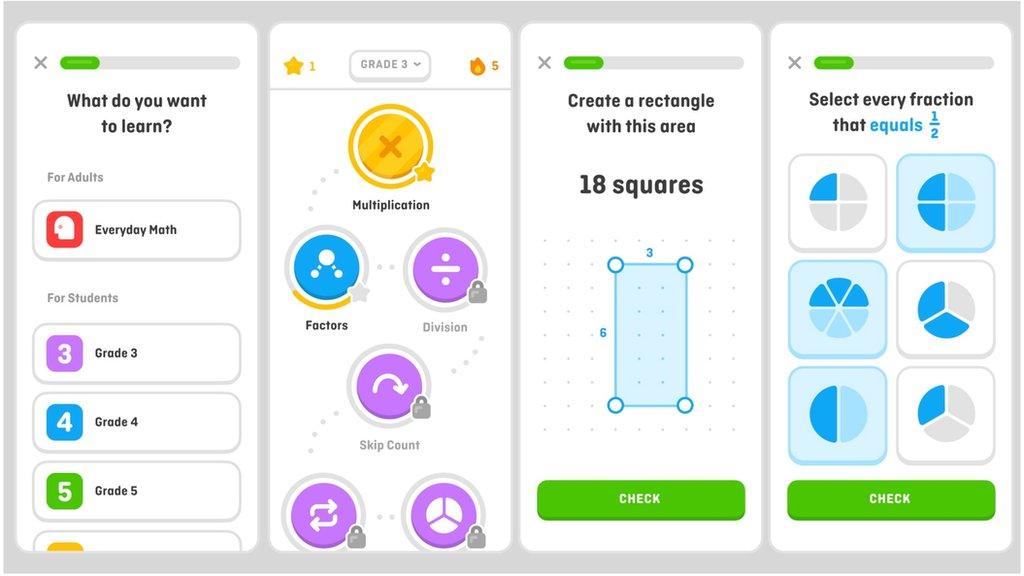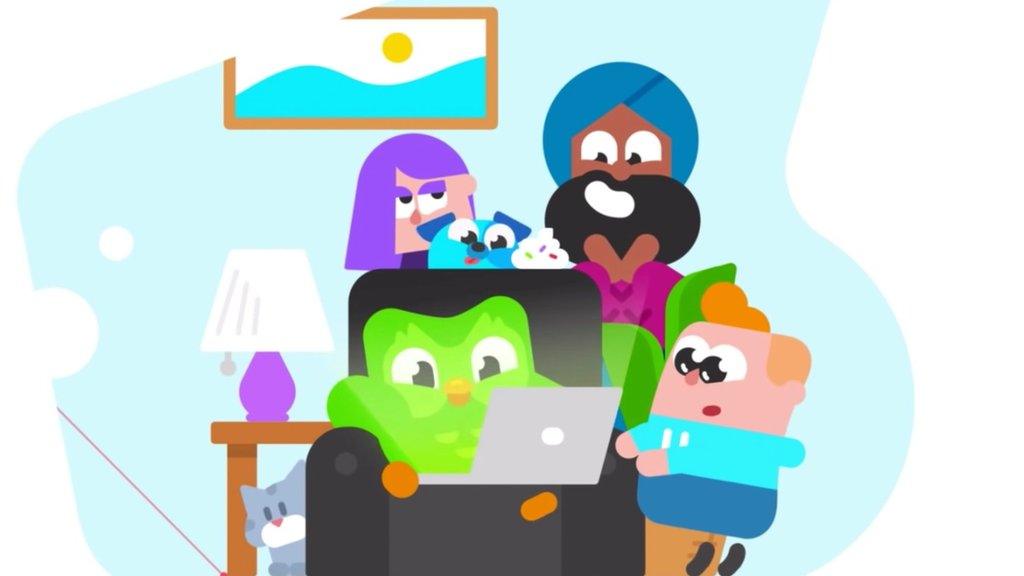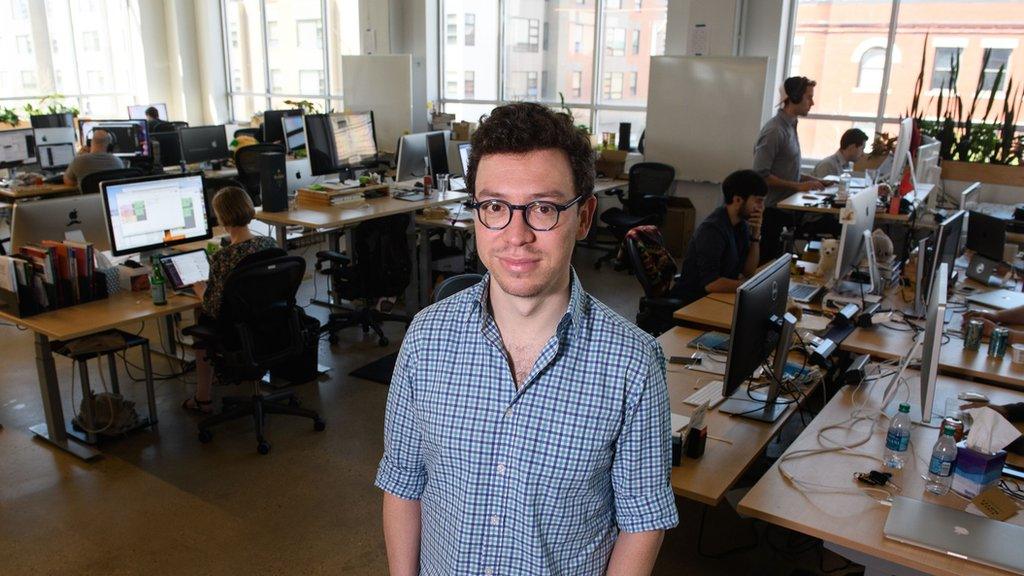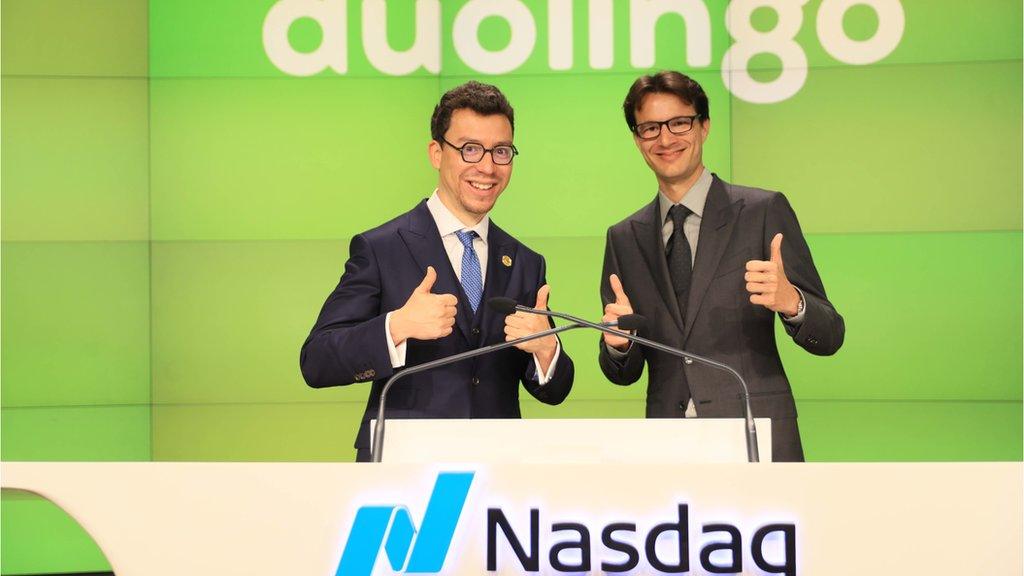Duolingo boss plans to take on TikTok with maths
- Published
Duolingo boss Luis von Ahn was speaking in an exclusive BBC interview
Duolingo founder and chief executive Luis von Ahn is aiming to lure children away from TikTok and Instagram with the popular language-learning app's new mathematics version.
The app, focused on primary-school-level mathematics, is due to launch next year.
And the company increasingly sees its rivals as other popular free apps such as TikTok and Instagram, rather than education platforms, since all are vying for screen-time attention.
"Duolingo is known for language learning but our mission has always been more general - it's about all of education," Mr von Ahn tells BBC News.
"To build physical schools around the world would cost billions, with smartphones we can reach two-thirds of the human population.
"But the problem with smartphones is they are a double-edged sword - they also come with interruptive things, like TikTok.

Development sketches released by Duolingo show what the new maths app may look like
"Parents tell us they think of Duolingo as productive screen time.
"We could add things that don't have educational value, just to keep people engaged, but we choose not to do that."
Launched in 2012, Duolingo has 40 million monthly users and been downloaded 500 million times around the world, including, it has just revealed, 20 million downloads in the UK.

Duolingo is known for the animated cartoon characters that populate its lessons
"We started with language learning because there was this humongous need around the world to learn English, which can immediately increase your income potential, but we've always wanted to teach other things," Mr von Ahn says.
He devised the app's first Spanish course himself, as a native speaker from Guatemala.
'Secret sauce'
Duolingo rewards users with digital coins and winning streaks, while cartoon avatars act as teachers.
But Mr von Ahn says: "Many people don't realise with Duolingo that when you start a lesson, it's personalised to you."
Some of this personalisation comes from tracking a user's previous performance but the app is also continually experimenting on its millions of users, improving its model through crowd-sourcing data - Mr von Ahn's speciality as an academic researcher at Carnegie Mellon University.

Duolingo is based in Pittsburgh, where Mr Mr von Ahn had been an academic, at Carnegie Mellon University
For example, the general rule is to teach people learning Spanish plurals before the subjunctive tense, Mr von Ahn says.
But when teaching an Italian Portuguese, is it better to teach adjectives before plurals?
To answer questions such as these, the app gives one batch of 50,000 new users the course in a different order, to compare their performance with that of those who used the previous method.
"Another part of the secret sauce," Mr von Ahn says, "is we don't just give you things you are not very good at, as this would be frustrating, we keep you as engaged as possible, with exercises that we think you have about an 80% chance of getting right.
"The hope is this is how [the new maths app] stands out - but it remains to be seen if it works."
'Strong credentials'
The translation from language to maths, however, may not be a straightforward equation - especially as the new target users will be mainly children.
Mathematics has a very different learning journey to languages, says Martin Hassler Hallstedt, a psychologist who studies children's education, at Uppsala University, in Sweden, and has developed his own maths games for children, including one called 'Count on me'.
"Duolingo is a popular platform with strong credentials," he says, "but it is not scientifically proven for maths.
"It will be interesting to see how it captivates younger children.
"Our research shows that for children, online maths learning has the best outcomes if it is fun, short and embedded in game design.
"It is not enough to simply be a digital version of maths homework."

Floated on the Nasdaq stock exchange in July, Duolingo is now valued at more than $6bn
China has led the way in the education-technology sector and the market is steadily growing across the developed world.
In the UK, though, it is competitive, with platforms such as Mathletics and HegartyMaths already popular.
They are sold directly to schools before being distributed to pupils, with the pandemic accelerating the uptake of online learning tools.
Duolingo has not yet decided if it will market its maths app to schools or individuals, Mr von Ahn says.
But it plans to follow the same business model as its language app, which is free.
Only 5% of users pay for a premium subscription - and 75% of the company's revenues come from this, the rest from adverts.
'Morally right'
There has been "tension" from both investors and some colleagues over sticking to this free model, Mr von Ahn says.
But it has helped the app grow - by word of mouth - and it is the key to its long-term future, while also being morally right.
"I'm from a poor country, Guatemala, and I saw the difference between those who had access to the best education and those that couldn't read and write, so I wanted to do something that will give people access to education," he says.
"In 2021, everyone should be able to get a high-quality education.
"There's decades of work left to do - but I'm dedicating my time to that."